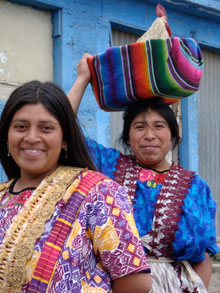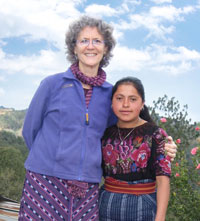Reaching Out to Guatemalan Women
By Jo Lynn Orr
 |
After seeing the needs of Guatemalan women firsthand as a graduate student, Nancee Neel helped start an organization to support women and girls through education, health care, and community building. Photo courtesy Rebecca Daubert |
The first time Nancee Neel visited Guatemala, she sensed an immediate connection. “I felt I had come home,” she recalls. It wasn’t the country’s breathtaking landscape of soaring mountains, lush cloud forests, and dazzling coastlines that drew her in; it was the people. “They are just amazing,” she says, “so loving and warm.”
Neel, an alumna of the UAB School of Public Health and former assistant professor in the school’s Department of Maternal and Child Health, first traveled to Guatemala in 1987 with David Coombs, Ph.D. (now professor emeritus of health behavior), to research her thesis for a master’s degree in public health. She returned the next year, and lived in Guatemala for six months while collecting information for her doctoral dissertation. Since then, she has gone back many times to learn more about the country’s culture, visit with friends, and make new ones.
Stepping Up
Seeking a way to improve the lives and health of Guatemalan women living in rural areas, Neel began informally working with a local cooperative called Pop Atz’iaq in 2004. She helped establish a microcredit fund for women and an educational scholarship program for girls. Then in 2006, she and some friends in Birmingham started Threads Weaving Dreams, a nonprofit organization that provides resources and support to Guatemalan women and their families through education, health care, and community building.
The Threads group also works with a clinic called Primeros Pasos, which has established the Stairway to Good Health (Escalera a Una Buena Salud) program to improve the health of women through nutrition education and other health-promotion efforts. Another Stairway goal is to improve participating women’s self-esteem and leadership qualities, and to foster community participation and awareness of gender and identity.
“It is an amazing three-year program,” Neel says. “The first year targets health education, including preventive measures and how to recognize different kinds of illnesses, as well as issues that arise at the family and community levels. They really educate the women, many of whom never had the opportunity to attend school. The second year is about empowerment—self-esteem, gender issues, participation in the political process—issues that the women have never had formal instruction in.”
Passing It Along
In their final year, women can choose to become health promoters in their communities or to engage in a beneficial community project that demonstrates what they have learned over the first two years.
This past summer, Rebecca Daubert, a UAB graduate student in health behavior, spent two months with the underserved communities of Guatemala’s Palajunoj Valley, where maternal morbidity and mortality are both high. While there, she conducted a survey of women participating in the Stairway to Good Health program as part of her master’s thesis.
“There are currently six participating groups throughout the Palajunoj Valley, with 96 women enrolled,” Daubert says. “Two groups are completing their first module year, two are in the last stages of their second module, and the remaining two groups are in the final stages of their last year.”
Daubert’s questionnaire was designed to determine if the women felt confident in applying the prevention and health promotion concepts and skills they had learned through the program. Results were positive overall, she says, and the feedback “should serve to improve the delivery of the program and help secure the funds necessary to keep it going and benefit more women and families living in the valley.”
 |
Nancee Neel with a scholarship recipient in the Guatemalan town of Chichicastenango |
Creating a Dream Team
The leaders of Threads Weaving Dreams include Neel (who serves as chair) and Birmingham professionals Ally Leonard (president), Bradford Kachelhofer (vice president), and Eve Laxer. They are working with several UAB entities to enhance the women’s education program in Guatemala and raise funds for the girls’ scholarship program.
Neel says her return visits to Guatemala remind her why she loves the country and its people. They also increase her determination to help make a difference in their lives. “During my last trip, I met a woman selling beautiful handcrafted shawls in the marketplace,” she recalls. “I bought one, and we began talking. She invited me home to meet her 80-something-year-old mother—the maker of the shawl. We hopped on a three-wheel ‘tuk-tuk’ bike [a local taxi] and took off down these bumpy dirt roads. The mother was this lovely woman, so vibrant and alive—and beautifully dressed. She greeted me with a big hug and was so happy that I came to meet her.
“If you’re willing to meet Guatemalans with your heart, they will meet you completely with theirs. I love being there.”
More Information